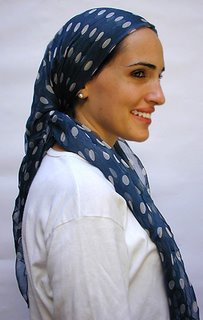
Annie: As someone who plans to cover her hair/head after marriage this seems threatening. Americans consider it rude to wear a hat indoors... where will that leave me? If this woman honestly believes that it is a modesty issue, it is akin to asking her to take her clothes off in front of men.
Harley: I don't understand how the veil prevents her from doing her job, unless she cannot be heard through it. That's the argument raised by the school officials [that the veil prevents her from doing her job; not that she cannot be heard through the veil].
Annie: I can understand that point, not just the hearing, but that it feels like she is putting up a barrier. But she agreed to remove it in the classroom if no adult males are present, which is not the same as saying that she will not work with males
Harley: Exactly the point I was about to make. In what way is she "denying the right of children to a full education"? There's nothing substantive to that argument.
Annie: My other concern is this: just like when the French schools prohibited any religious head coverings in public schools, this makes it clear that religious people are not welcome in the public sphere and forces them to go to the private sphere, which only strengthens their lack of integration into the community, keeps them more separate and feeling more like second class citizens. They are building a "fifth column" with their intolerance.
Harley: As well, it's a double standard to the extent that they're preventing a Muslim woman from practicing her faith, but in no way restraining other faiths, which returns us to your initial point about head coverings for traditionally observant Jewish women
Annie: [This ruling] often will restrain other faiths: Judaism for example, Sikhism
Harley: "The opposition Conservatives also weighed in, with one of the party's top officials accusing Muslim leaders of encouraging a "voluntary apartheid" that could help spawn homegrown terrorism."
Annie: They are creating the apartheid themselves by making her leave.
Harley: Regardless of whether veils "suck" (thanks, Salman Rushdie) or whether some of us believe that they disempower women, those women who through a traditional , fundamental, or conservative reading of their texts/laws choose to dress modestly, should be supported for making that choice. Clothing is an issue, but there are far more insidious and dangerous instances of religious misogyny that to point to a woman, who chooses to wear a veil and defends that decision to the loss of her job, is itself a disempowering act. The point of feminism (choice feminism, that is) is to give women the choice to express themselves.
"The debate on the veils began this month when Jack Straw, the former foreign secretary who now serves as leader of the House of Commons, said Muslim women visiting his office should remove them." When Jack Straw insists that Muslim women visiting his office remove their veils, he is violating them
Annie: Even apart from the religious issue, if it is a modesty issue then that is akin to asking a woman to go without a bra. Not what the society would consider naked, but still alluring.
Harley: I was totally going to use a similar analogy about wearing a miniskirt or something similarly immodest. I think a measured liberal response (which I try to have after my morning coffee) should be outrage. Can outrage be a measured response? For example, were a woman to wear pants to Straw's office and he insist that they wear skirts, we would be disgusted. We just need to see the hypocrisy where it exists.
Muslim Leaders of Tomorrow (MLT) provides a detailed explanation of the scholarly Muslim through behind wear a niqāb (face-veil) as well as pointing out analogous Jewish tradition. While only a minority of scholars consider the niqāb to be an obligatory act, “the majority of scholars consider the covering of the face for an adult Muslim female with the face-veil or niqāb in the presence of non-related adult males as a religiously praiseworthy action.” MLT agrees with us that the debate that resulted from Straw’s remarks allowed the non-Muslim public to realize, “Muslim men are not sitting at home with a whip, forcing their women to cover their selves up but rather it is a decision based upon ones deep spiritual convictions to the concept of modesty and respect and above all, a sign of ones complete devotion to the Law of God.”
For the Progressive Feminist perspective, check out Republic of Palau’s post on Progressive Gold. She discusses niqāb and hijab from a cultural perspective, pointing out the diversity within the Muslim world and modest dress as a statement of identity, as much as an religious expression.
In “For women of different faiths, a dilemma: What’s modest dress?,” Lisa Sopher reports a discussion held between Jewish, Christian, and Muslim women on the treatment of modesty in clothing in their respective religions.
No comments:
Post a Comment